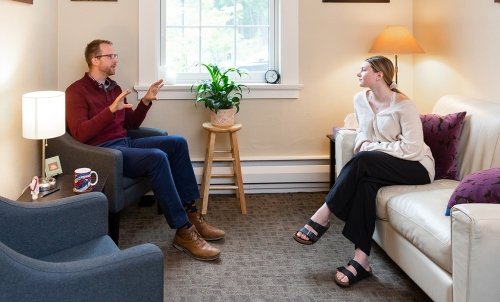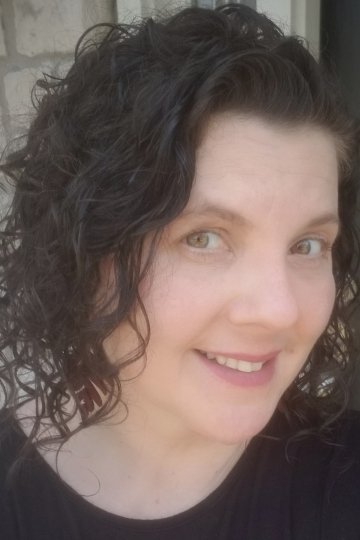
Master of Arts in Counseling
The Master of Arts in Counseling Program (MAC) prepares professionals in the theoretical foundations and skills necessary for master’s-level positions in the fields of individual, couple, and family counseling. Built on a philosophy of service, intellectual hunger, fundamental respect, social justice, and a focus on the person of the counselor, the MAC program strives to embody spirit, empathic care, intellect, and wisdom. The MAC program is characterized by personal, social, and professional transformation, liberation, and enrichment.
Jump to
Why Saint Martin's University?

Application deadlines
| Term | Priority deadline | Deadline as additional spots are available |
|---|---|---|
| Fall | March 1 | 3rd Monday in June |
| Spring | N/A | 3rd Monday in October |
Note: admissions submitted after these deadlines may still be considered at the discretion of each program.
Mission statement
The Master of Arts in Counseling program at Saint Martin’s University is guided by the values of the American Counseling Association, the National Board for Certified Counselors, and other nationally recognized professional organizations and accrediting bodies for counselor training. Grounded in the Catholic Benedictine tradition, the program cultivates compassionate and courageous counselor-leaders who integrate reflection, justice, empathy, community and respect in their clinical practice. We foster an environment where students engage in ongoing self-reflection and learn to honor each person’s lived experience through empathic, systemic, and trauma-informed theoretical practices. We emphasize practices that contribute to improving the overall wellness of individuals, families, and communities.
Through rigorous coursework, supervised clinical experiences, and professional advocacy and engagement opportunities, our graduates gain knowledge and skills that prepare them to provide individuals, families, and groups with ethical, empathic, and competent care. In the spirit of sincere Benedictine hospitality, the program extends welcome to students from all backgrounds, worldviews, and faiths, including those without religious affiliation. We affirm the dignity of all people and honor each unique voice in support of an engaged learning community.
MAC program objectives
- Demonstrate professional and ethical integrity grounded in the values and standards of the counseling profession, including a commitment to ongoing professional development, growth and counselor wellness.
- Honor the unique context of each client and promote justice, engaging clients and communities with humility and inclusivity.
- Apply knowledge of human growth and development, including the impact of trauma and grief, to foster resilience, wellness and healing across the lifespan.
- Integrate career development theories to help clients find meaning and purpose in their work and life roles.
- Establish effective helping relationships grounded in theoretical orientations that reflect empathy, authenticity, and respect and understanding of the impact of the “person of the counselor.”
- Develop and facilitate group counseling experiences that promote belonging, empowerment and collaborative growth.
- Use assessment ethically and competently to inform diagnosis, treatment planning and evaluation within contextual frameworks.
- Use research to inform clinical practice to enhance effectiveness and promote best-practices.
- Apply diagnostic frameworks with awareness of their systemic, cultural, and ethical implications and demonstrate the ability to conceptualize cases responsibly, recognizing how diagnosis affects clients within diverse social and institutional contexts.
- Demonstrate advocacy, community collaboration and active engagement in the counseling profession to promote mental health equity and systemic change.
Program Highlights and Resources
- All required courses are offered at least once per academic year. All courses are offered on a schedule of one meeting per week with on-ground courses being offered in the afternoon, and digital delivery courses offered in the evening. In Summer term, most course are offered via digital delivery, or a combination of on ground and digital delivery (blended) format. During the Admissions process, MAC students are asked to indicate whether they intend to pursue the on-ground or digital delivery, method of instruction. While rare, from time-to-time, based on enrollment needs, courses may be offered exclusively in one format or the other in any given term.
- Coursework in the MAC program supports counseling careers and licensure in the State of Washington for Licensed Mental Health Counselors (LMHC) and may also provide preparation for the Licensed Marriage and Family Therapists (LMFT), dependent upon electives taken.
- MAC students are trained to work with individuals, couples, relationships, family systems, and groups.
- Teaching methods include dyad, small-group work, lectures, media, presentations, and discussions as well as supervised role playing, and introspective exercises.
- A required 100-hour practicum, and 600-hour internship complement coursework by providing students with a supervised, in-depth opportunity to work in a variety of counseling settings.
MAC faculty areas of interest
Anti-oppression, access and technology, collaboration, decolonization, community, indigenous wisdom, military and families, professional identity, relational approaches to research, spontaneity and creativity, subtle activism, and vulnerability.
Specialty areas
MAC Students are trained to work with individuals, couples, relationships, families, and groups from a systemic and contextually sensitive perspective. The program prepares students for licensure in the State of Washington as Mental Health Counselors (LMHC); and may prepare students for licensure as Marriage and Family Counselors (LMFT), dependent upon elective choice.
Methods of instruction
Teaching methods include use of dyads, small-group work, lectures, media, presentations and discussions, as well as supervised role playing, and introspective exercises. Students complete a required 100-hour practicum course, after successfully completing the pre-requisite courses, typically in their second spring or third fall of the program. Students complete a 600-hour internship during the fall and spring of the third year.
Advising
All students are assigned an advisor from the core faculty upon admission, and whom they will consult with each Fall and Spring in preparation for the next term. The advisor accompanies MAC students throughout their MAC journey and is often the first contact when students have scheduling and policy questions; provides assistance navigating conflict or misunderstandings; and supports students as they consider academic, clinical, and professional identity development needs. MAC also offers group scheduling meetings in the Fall and Spring semester that may be led by the chair of the program or by the students’ advisor.
Matriculation Process
Each applicant who is admitted to the MAC program is admitted conditionally. Successful MAC students maintain a 3.0 grade point average (or above), demonstrate alignment with the ACA Code of Ethics (2014) and the field of counseling, as well as engage in counselor appropriate reflection and analysis of growth opportunities through self-assessment and in collaboration with your advisor and faculty through the MAC 5 Areas of Assessment (in class and programmatically). These skills are reinforced during their Foundation (first year) and through the first half of their Impacts (second year) coursework and then students are given the opportunity to achieve full admission through the Degree Candidacy process (described in the MAC Handbook). Achieving Degree Candidacy status is a prerequisite for beginning MAC 668 Internship 1 and successfully completing the MAC program.
Looking for handbooks, annual reports, or more resources?
Current students can access syllabi through Moodle and prospective students may contact the department chair to review current syllabi.
MAC Program Information Resources:
Master of Arts in Counseling Requirements
Admissions criteria
- Bachelor’s degree from a regionally accredited college or university.
- Overall 3.0 undergraduate GPA or graduate coursework GPA.
- No GRE is required for entrance.
Visit graduate admissions online to find out more about what it takes to apply for the MAC program.
Program cost
Per credit 2022-2023:
- $1320 per credit (civilian)
- $500 per credit (active duty military)
Projected tuition for the three-year MAC program:
(subject to change as credit cost can fluctuate each year)
- $79,200 (civilian)
- $30,000 (active duty military)
Financial aid
Learn more about your financial aid options as a MAC student.
Program candidates must complete the program in three to seven years. The MAC program follows a cohort model: Below is the designed three-year progression, Year One focuses on foundations of counseling, Year Two on impacts, and Year Three on reflective practice. The progression of the program in four to seven years is available for reference below in "Additional Forms."
While the design of the program is for students to complete in three years, under special circumstances the time limit for completing degree requirements is seven years. Students who fail to take courses for more than one academic year will be required to re-apply to the program and re-enter under requirements current at the time the new application is submitted.
The official, most up-to-date class offerings can be found by using Self-Service or the graduate academic catalog. For significant term dates refer to the academic calendar.
Year 1: Foundations (18 semester credits)
Fall (6 credits)
- MAC 508: Counseling and Helping Relationships
- MAC 528: Foundations of Counseling
Spring (6 credits)
- MAC 529: Counseling Theories
- MAC 538: Professional Counseling Orientation and Ethics
Summer (6 credits)
- MAC 548: Crisis, Trauma, Violence, Abuse
- MAC 568: Human Growth and Development
Year 2: Impacts (24 semester credits)
Fall (9 credits)
- MAC 579: Group Counseling
- MAC 588: Psychopathology and Diagnosing
- MAC 589: Foundations of Clinical Mental Health
Spring (9 credits)
- MAC 618: Social and Cultural Diversity
- MAC 628: Assessment and Appraisal
- MAC 629: Counseling Practicum
Summer (6 credits)
- MAC 638: Child and Adolescent Counseling
- MAC 649: Impacts of Addictions
Year 3: Reflective practice (18 semester credits)
Fall (6 credits)
- MAC 659: Research and Program Evaluation
- MAC 668: Counseling Internship 1
Spring (6 credits)
- MAC 678: Counseling Internship 2
- MAC 679: Career Development
Summer (6 credits) Any 2 of these courses:
- MAC 695 Special Topics: CMH Elective #1*
- MAC 695 Special Topics: CMH Elective #2*
- MAC 689: Human Sexuality and Relationships **
- MAC 698: Studies in Systemic Counseling **
*Meet LMHC requirements for Washington State **Meet LMFT or LMHC requirements for Washington State
Counseling must be conducted by a licensed mental health counselor, a licensed marriage and family therapist, a licensed clinical social worker, a licensed clinical psychologist, or an MD psychiatrist. The counselor must be approved prior to beginning counseling. Faculty advisors can assist students with questions regarding the approval process.
All MAC students will become members of the American Counseling Association (ACA).
This membership provides students the opportunity to build a sense of professional identity and commitment to the profession. Students are encouraged to attend conferences, events and workshops hosted by the professional counseling organization they become a part of. Faculty advisors may assist students with questions regarding this membership and related activities.
Does the coursework meet the requirements of the Department of Health credentials "Licensed Mental Health Counselor" and/or "Licensed Marriage and Family Therapist"?
The coursework is designed to match or exceed the Department of Health requirements which are listed under WAC 246-809-220 (for MHC) and WAC 246-809-120 (for MFT) at their website. Look under Sections 120 and 220 at this link.
Can I work full time and complete the MAC program?
All required courses are offered at least once per year during afternoon or evening hours. All courses are offered on a schedule of one meeting per week. MAC students who work during the day are most often able to join our evening online cohort and MAC students who have flexible work schedules may be able to join the on-ground afternoon cohort. MAC students also have to option to take between 3 years and 7 years to complete the program.
Are there opportunities for students to work in the program such as assistantships or teaching assistant positions?
Our program does not currently offer teaching assistant positions to students. Graduate Research Assistant (GRA) positions may be available for MAC students. GRAs work in service of program faculty or campus administration 10 hours per week in exchange for a partial tuition waiver.
MAC full-time students (enrolled in 2-3 credit courses) are eligible for Graduate Assistantships (GA) throughout the university. There is typically one or more GA positions available in the MAC program and others throughout the university. The number of available positions fluctuates each year.
If either of these positions interests you, please review the process defined here and utilize the link to apply for a position.
What are my employment options with a MAC degree?
By far, the most common career objective among graduate students is to become an individual, group or family counseling. Students wish to work with a variety of age groups and specific clientele and deal with divergent presenting problems such as anger control, sexual abuse, chemical dependency, and so on. Most of these students hope to work in mental health agencies, treatment facilities, and private practice agencies.
Master of Arts in Counseling at a Glance
- Degree
- Master
- Program Type
- Master’s Degree
- Campus
- Main (Lacey)
- Type of Instruction
- In Person
- Online

 Community
Community






